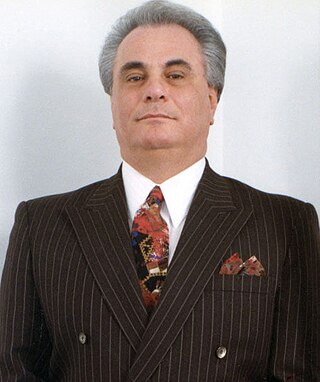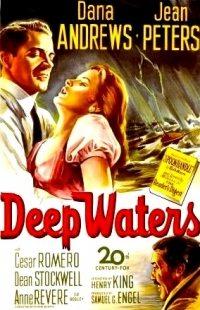
Lee Harvey Oswald was a U.S. Marine veteran who assassinated John F. Kennedy, the 35th president of the United States, on November 22, 1963.

John Marcellus Huston was an American film director, screenwriter and actor. He wrote the screenplays for most of the 37 feature films he directed, many of which are today considered classics. He received numerous accolades including two Academy Awards and three Golden Globe Awards. He also received a star on the Hollywood Walk of Fame in 1960 and the BAFTA Fellowship in 1980.

John Joseph Gotti Jr. was an American mafioso and boss of the Gambino crime family in New York City. He ordered and helped to orchestrate the murder of Gambino boss Paul Castellano in December 1985 and took over the family shortly thereafter, leading what was described as America's most powerful crime syndicate.

Anjelica Huston is an American actress, director and model known for often portraying eccentric and distinctive characters. She has received multiple accolades, including an Academy Award and a Golden Globe Award, as well as nominations for three British Academy Film Awards and six Primetime Emmy Awards. In 2010, she was awarded a star on the Hollywood Walk of Fame.
The Gambino crime family is an Italian-American Mafia crime family and one of the "Five Families" that dominate organized crime activities in New York City, within the nationwide criminal phenomenon known as the American Mafia. The group, which went through five bosses between 1910 and 1957, is named after Carlo Gambino, boss of the family at the time of the McClellan hearings in 1963, when the structure of organized crime first gained public attention. The group's operations extend from New York and the eastern seaboard to California. Its illicit activities include labor and construction racketeering, gambling, loansharking, extortion, money laundering, prostitution, fraud, hijacking, and fencing.
The Genovese crime family, also sometimes referred to as the Westside, is an Italian-American Mafia crime family and one of the "Five Families" that dominate organized crime activities in New York City and New Jersey as part of the American Mafia. The Genovese family has generally maintained a varying degree of influence over many of the smaller mob families outside New York, including ties with the Philadelphia, Cleveland, Patriarca, and Buffalo crime families.

Bill Clinton, the 42nd president of the United States, was impeached by the United States House of Representatives of the 105th United States Congress on December 19, 1998, for "high crimes and misdemeanors". The House adopted two articles of impeachment against Clinton, with the specific charges against Clinton being lying under oath and obstruction of justice. Two other articles had been considered but were rejected by the House vote.

The Red Badge of Courage is a 1951 American war film made by MGM. Directed by John Huston, it was produced by Gottfried Reinhardt with Dore Schary as executive producer. The screenplay is by John Huston, adapted by Albert Band from Stephen Crane's 1895 novel of the same name. The cinematography is by Harold Rosson, and the music score by Bronislau Kaper. The making of this film is the subject of Lillian Ross's 1952 book Picture, originally in The New Yorker.

Frank Pentangeli is a fictional character from the 1974 film The Godfather Part II, portrayed by Michael V. Gazzo. Gazzo was nominated for a Best Supporting Actor Oscar for his performance, which he lost to Robert De Niro, his co-star from the same film. He is nicknamed "Frankie Five Angels" from his last name, which is formed from the Greek-derived prefix penta- and the Italian word angeli ("angels").

Yellow Sky is a 1948 American Western film directed by William A. Wellman and starring Gregory Peck, Richard Widmark, and Anne Baxter. The story is believed to be loosely adapted from William Shakespeare's The Tempest. The screenplay concerns a band of reprobate outlaws who flee after a bank robbery and encounter an old man and his granddaughter in a ghost town.
The Lucchese crime family's Brooklyn faction is a group of Italian-American mobsters within the Lucchese crime family that control organized crime activities in the New York metropolitan area but are predominantly based out of Brooklyn and Staten Island. The Brooklyn faction was created after two separate crews in the Lucchese family were merged together. The merger occurred during the early 2000s, when the Lucchese family administration decided that Vario Crew Caporegime Domenico "Danny" Cutaia would also take control of the 19th Hole Crew. The Lucchese family administration saw the 19th Hole crew without leadership because it had been crippled by numerous indictments and informants during 1990s, leaving many members imprisoned. After the merger of the two crews, the Lucchese Borgata referred to this crew as the Brooklyn faction.
Lee Whitlock was a British television and film actor. Of the many roles in film and TV, they included Shine on Harvey Moon (1982), Two of Us (1987), Casualty (1991), Grange Hill (1993), Sweeney Todd: The Demon Barber of Fleet Street, London's Burning, and The Bill and Ill Manors (2012).

Thomas Fitch was an American lawyer and politician. He defended President Brigham Young of the Church of Jesus Christ of Latter-day Saints and other church leaders when Young and his denomination were prosecuted for polygamy in 1871 and 1872. He also successfully defended Virgil, Morgan, and Wyatt Earp along with Doc Holliday when they were accused of murdering Billy Clanton, and Tom and Frank McLaury during the October 26, 1881 Gunfight at the O.K. Corral.

The House Committee on Un-American Activities (HCUA), popularly the House Un-American Activities Committee (HUAC), was an investigative committee of the United States House of Representatives, created in 1938 to investigate alleged disloyalty and subversive activities on the part of private citizens, public employees, and those organizations suspected of having communist ties. It became a standing (permanent) committee in 1946, and from 1969 onwards it was known as the House Committee on Internal Security. When the House abolished the committee in 1975, its functions were transferred to the House Judiciary Committee.

Deep Waters is a 1948 American drama film directed by Henry King and starring Dana Andrews, Jean Peters and Cesar Romero. The film is based on the 1946 novel Spoonhandle written by Ruth Moore and was nominated for a 1949 Oscar for Best Special Effects, but lost to Portrait of Jennie.
The Ergenekon trials or the Ergenekon conspiracy, were a series of high-profile trials which took place in 2008–2016 in Turkey in which 275 people, including military officers, journalists and opposition lawmakers, all alleged members of Ergenekon, a suspected secularist clandestine organization, were accused of plotting against the Turkish government. The trials resulted in lengthy prison sentences for the majority of the accused. Those sentences were overturned shortly after.

The O.K. Corral hearing and aftermath was the direct result of the 30-second Gunfight at the O.K. Corral in Tombstone, Arizona Territory, on October 26, 1881. During that confrontation, Deputy U.S. Marshal and Tombstone Town Marshal Virgil Earp, Assistant Town Marshal Morgan Earp, and temporary deputy marshals Wyatt Earp and Doc Holliday shot and killed Billy Clanton, and Tom and Frank McLaury. Billy's brother Ike, who had repeatedly threatened to kill the Earps for some time, had been present at the gunfight but was unarmed and fled. As permitted by territory law, he filed murder charges against the Earps and Doc Holliday on October 30.
The Expert is a 1932 American pre-Code comedy-drama directed by Archie Mayo and starring Chic Sale and Dickie Moore. It is based on a 1924 Edna Ferber and George S. Kaufman play, Minick, which is based on the short story "Old Man Minick" by Ferber. The film was produced and distributed by Warner Brothers.

The trial of Benjamin Netanyahu began following investigations into allegations of bribery, fraud, and breach of trust by him and close political allies within his inner circle during his fourth and fifth terms as Israel's Prime Minister. The Israel Police began investigating Netanyahu in December 2016 and subsequently recommended indictments against him.
Alieu Kosiah is a former commander of the United Liberation Movement of Liberia for Democracy (ULIMO) faction, a rebel group that participated in the First Liberian Civil War (1989–1996) which fought against the National Patriotic Front of Liberia, led by Charles Taylor. After the war, Kosiah moved to Switzerland, where he obtained permanent residence.













